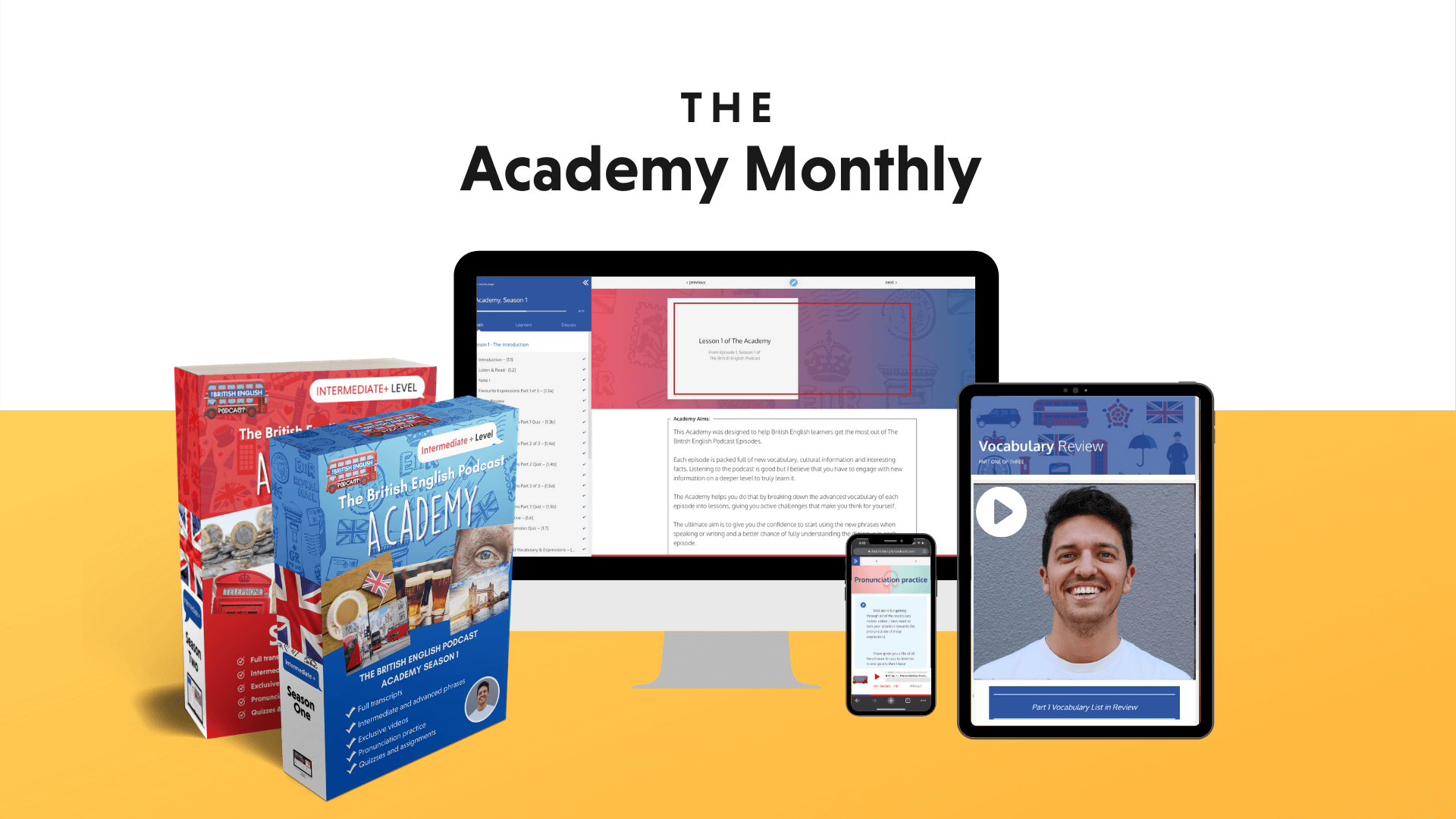Transcript of Bitesize Ep 19 Transcript
Charlie:
Hello and welcome to this bitesized episode with myself, Charlie Baxter, on the British English podcast. The show that helps you improve your British English and better understand British culture. And for that fact, I got my great friend Ricky Gill on the show again to go over some of his ideas on the history of the class based system. We managed to discuss the way the Romans might have affected it, how the classes could be shifting as we speak, what pubs have to do with it, and- and even the smoking ban.
Charlie:
The list actually goes on, but I'll leave the summary there. Remember to grab the free worksheet for this episode before you begin listening to better understand some of the native expressions that come up in natural conversation between myself and Ricky. And that is over at www.thebritishenglishpodcast.com/freebies F R E E B I E S freebies. Oh, and if this is your first time hearing a conversation between myself and Ricky, how should I introduce him? He has a fascinating job and has spent the last 20, 25 years or so researching the psychology of, well, happiness and general well-being through multiple disciplines within psychology, including mindfulness and NLP, hypnosis and many, many more. And he's my go to guy for anything and everything around mental health. And, well, despite his wealth of knowledge in this area, he really doesn't take himself too seriously, which is why I enjoy having these conversations with him that lead in all sorts of directions. So, yes, I hope you enjoy this conversation around the class based system in the UK with Ricky Gill.
Charlie:
Off-air, you were telling me a little bit about what you had heard of the historical upbringing of the divide between the north and the south.
Ricky:
Yeah, I donn't know whether this is history or just my own pigeon theory *pigeonhole principle*. But, you know, we know the Romans didn't have a great time.
Charlie:
Ok.
Ricky:
In the north of the country, you know, maybe that's where it starts from. Right. You know, they sort of went, well, okay, this isn't much fun. These people, like, they just, you know, not very cooperative and they're not giving up without a fight. And then eventually they built Hadrian's Wall and just turned around. Right.
Charlie:
Ok.
Ricky:
Whereas, you know, my- my very cursory understanding of history suggests that the south of England eventually saw some of the good that the Romans brought.
Charlie:
They liked the straight roads eventually.
Ricky:
Yeah. You know, they like the order and the bathing and, you know, ordered society and you know, whereas- there's more of this, huh? But you see, here's the thing, that traditional north-south culture divide. Although there is an economic disparity, and probably a disparity- well, there is a disparity in the way central government treats the regions. I would say the shared culture between people would be quite similar, depending on what class of society there is. That make sense? So, you know, let's- let's draw an imaginary fictitious line and say that we've always had the working class. Which, you know, the heyday of the working class in this country, you know, may have come and gone.
Ricky:
In- in the sense that we don't really produce anything, manufacture anything, in this country. I think I may be right in understanding that the last thing that was made and built in this country was the Humber Bridge from British Steel.
Charlie:
Oh right.
Ricky:
I hope I'm not incorrect with that, it was a long time ago.
Charlie:
The what bridge?
Ricky:
The Humber Bridge.
Charlie:
Where's that?
Ricky:
Somewhere up north. I don't go there, so you'd have to look on a map. I'm only kidding. That's a little more south humour. Right? So, you know, you know, the industry- industry for the working class has obviously took a big hit, a big hit. And then the working class is- it's sort of fragmented into: a) still the working class is reinvented. And then maybe the benefits class where nothing was really supported, no real industry was there for them to latch onto. And then what seems to have burgeoned and once again, these are all my non-academic observations. What seems to have burgeoned is the middle classes.
Ricky:
And, you know, we have this burgeoning middle class that it seems the entry level for middle class work is anything that doesn't involve digging ditches on the side of a road. But, you know, maybe to some extent, you know, basic administrative roles are giving people access to middle class culture. And then what's happening in the middle class culture is- is- is it's- it sort of segmenting into the lower middle classes? The middle-middle class is in the upper-upper middle classes, which is a whole other conversation right?
Ricky:
And. You know, I, I think probably one of the most- a lot of people that I would see are from the middle and the upper range of the middle classes. Who have good careers, who run businesses, who are socially climbing, for all intents and purposes. And- and there's a lot of aspiration there. And aspiration ambition often comes with stress as well.
Ricky:
And- and then, of course, you have, you know, what they used to call the ruling elite. You know, the- the- the upper classes, which predominantly are a culture that has been imbued by hereditary wealth. You know, the passing down of land, the passing down of property and other assets. And they are, quote unquote, the- the- maybe the families that have been in Britain for many, many, many, many generations. But we know that that middle class tier is made up by a lot of people who, in the last few generations, have possibly moved to Britain and who have, quote unquote, worked hard.
Charlie:
Hmm.
Ricky:
A very interesting place, Britain.
Charlie:
Yeah.
Ricky:
Very, very interesting place, not easy to sort of throw your hat over something and say, I understand it.
Charlie:
No.
Charlie:
I'd like to remind you have The Academy. Which is where I pour my blood, sweat and tears into every single episode. I go into further detail, giving you more content to enjoy and then deliver manually edited transcripts, video explanations of the advanced expressions used in the episode, pronunciation practise, quizzes, assignments, flashcards, glossaries for all the definitions, etc, etc. So if you wanted to come away using the advanced language I'm exposing you to in each episode with confidence, then I highly recommend you join The Academy. To do that, you can head over to www.thebritishenglishpodcast.com and you'll even be able to get a sample of The Academy completely free.
Ricky:
But like I was saying, there are certain markers in British culture that may give you access and membership to every class. From the benefits class to the ruling elite, if we're going to call them that, or the upper classes; to the work, the traditional working class, what's left of them, and then that broad bandwidth of the middle classes. You know what they are? The love of dogs. And the love of alcohol. Right? Maybe if you- you know- and the love of-.
Charlie:
Love of dogs, I immediately understand, I think. The love of alcohol. Can you explain that one? Is that because we're all in the pub together side by side?
Ricky:
The pub's been a great leveller of British culture.
Charlie:
I almost thi- feel like it's a flip reverse of roles.
Ricky:
You think so?
Charlie:
Yeah, I feel like the.
Ricky:
Maybe there's some very affluent pubs and some very working class pubs. And then there's the benefit class pubs, which. Yeah, they're- they're kind of interesting. Right. But I would say my experience of pub- pub, I mean, you've got to do a whole podcast on pub culture. Right, because it's literally its own thing that needs to be taken apart. But maybe, maybe the pub historically has been a place that members of the different broad cross sections of society have converged. And have found something that despite their obvious differences, but one thing that's connected them. The- the enjoyment of a drink. Right. That would be my observation.
Charlie:
A pint of bitter. Yeah.
Ricky:
And, you know, that's- it's just an interesting thing because we know since the smoking ban came, that- I mean, when I was growing up, you'd go. I used to play football for a pub team and we'd all go back to the pub afterwards to have drinks and some food. I mean, I would be smelling of cigarettes for like three weeks. Like you put all your clothes in the wash, but you'd be walking through like a dense cloud of smoke. It was pretty grim. And you couldn't get any good food in pubs in those days. You'd get ham, egg and chips if the landlady could be bothered to do some lunch. Right. And what's happened is that since the smoking ban, pubs probably can only survive by turning out really nice foods. The pubs are actually now a really nice place to get good quality bistro food in different parts of Britain. Obviously, you still got a bit of a divide. But on the whole, for pubs to survive, they're going to need to start producing really good quality food.
Charlie:
Mm hmm. I hadn't thought of it like that. Yeah, it's amazing the difference of what the smoking ban did.
Ricky:
A massive difference, and I'm glad. I mean, I'm an asthmatic, so I always used to like to- I always used to like to go to pubs for pub lunches. And there's always been something of a pub lunch culture, certainly a Sunday lunch culture. But, you know, now, I mean, in our village that we're in, we've got a pub that has amazing food every day of the week. And, you know, and that's the cool thing, right?
Charlie:
Yeah, definitely.
Ricky:
But maybe a love of alcohol, and the love of dogs. I mean, if you look at the working classes or the upper classes, dogs and alcohol are a prevalent feature in their lives. You look at the middle classes, dogs and alcohol, probably a prevalent feature in their lives, too. Right.
Charlie:
Yeah. And everyone has access to them.
Ricky:
Everyone has access to dogs and alcohol.
Charlie:
Yeah.
Ricky:
I mean, I don't drink and I have dogs. So like I said, I'm always an outlier anyway. Right. I've never really fit it in anywhere in society. So I'm comfortable with my position of being an observer.
Charlie:
But sometimes I feel like that's a healthy place to be.
Ricky:
I think so. Yeah.
Charlie:
Cool. Ok, well, Ricky, it's been amazing. I'll put your links in the description box and the show notes. But Ricky, would you ever think about doing another one of these podcasts in the future?
Ricky:
If I get to hang out with you, then, yes! I'd love to! I'd love to.
Charlie:
Fantastic. Ok, we will leave it there, guys.
Ricky:
It's just getting warmed up, Charlie.
Charlie:
Yeah. Yeah, we are. Gosh, we've got so many- so much to cover. But yeah. Thank you so much, Ricky. And I guess I will see you in the future.
Ricky:
Aye, aye! Lovely. See you soon!
Charlie:
See you soon, guys.
Ricky:
Bye!
Charlie:
That's all for me this week. I hope you have a good seven days ahead of you. My name is Charlie Baxter, and I will see you next time on the British English podcast.











